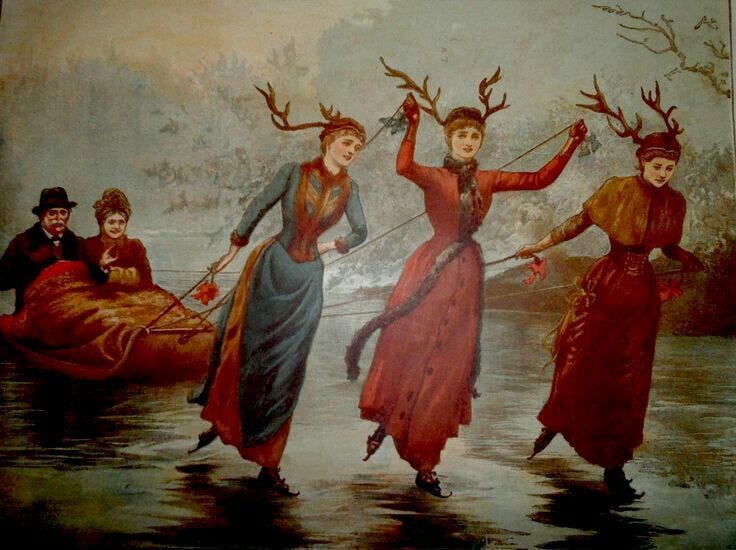Paganism: Not the Problem!
Happy post-Christmas, post-Boxing Day, eleventy-seventh day of Christmas and ongoing Yuletide festival of wearing comfy pants and eating leftovers! Maybe you saw this horrendous editorial published by The Atlantic this week, on Christmas Day, in fact, “The Return of the Pagans.” The author, a rabbi and scholar of Judaism named David Wolpe, begins with this smug subtitle: “Hug a tree or a dollar bill, and the pagan in you shines through.”
Um, what?
He then offers Donald Trump and Elon Musk as people emblematic of the expression of paganism in the world today. (Again, whaaaaaat?) Wolpe goes on to say: “Although paganism is one of those catchall words applied to widely disparate views, the worship of natural forces generally takes two forms: the deification of nature, and the deification of force. In the modern world, each ideological wing has claimed a piece of paganism as its own. On the left, there are the world-worshippers, who elevate nature to the summit of sanctity. On the right, you see the worship of force in the forms of wealth, political power, and tribal solidarity. In other words, the paganism of the left is a kind of pantheism, and the paganism of the right is a kind of idolatry.”
First of all, David, there’s nothing actually wrong with elevating nature to a summit of sanctity. Also, WTF is “the paganism of the right?” You know most of those folks are deluded Christian nationalists, right? But I digress.
Wolpe’s failure to refer to paganism through a classical or contemporary lens makes this piece hugely problematic, and his definition of the term arbitrary at best, derogatory at worst.
The Wild Hunt wrote a great editorial in response, referring to The Atlantic’s long tradition of well-informed editorial writing. My friend Sabina Magliocco, a scholar of religion, penned an excellent letter to the magazine, and gave me permission to put it here in its entirety.
A Response to David Wolpe, “The Return of the Pagans,” The Atlantic 12/25/2023
To the Editor:
As a long-time reader of and subscriber to The Atlantic, I was dismayed that you chose to publish David Wolpe’s essay “The Return of the Pagans” (12/25/2023). The essay is misinformed and distorts both historical and contemporary understandings of paganisms in ways that are profoundly damaging to both Indigenous and revived religions.
Wolpe never defines the word “pagan.” Instead, he appears to construct a straw man, using it to mean something akin to “idolatrous” in his eyes. The problem is that the term “pagan” already has a meaning: one that refers to a number of religions. These include Classical paganism, as practiced in the ancient world; non-monotheistic Indigenous religions; and modern Paganisms, a collection of new religious movements that revive, reconstruct, and experiment with elements of ancient polytheistic worship. None of these embrace the values or ideologies Wolpe attributes to paganism.
It is shocking how ignorant Wolpe is about Classical paganism, a topic about which there is a vast academic literature usually well covered in rabbinical schools. For example, he says, “The Greeks taught the rich and powerful were favored by the gods.” Nope, sorry, that would be the Calvinists. Concern for the poor and less fortunate did not originate with Judaism and Christianity. Greek and Roman religion had built-in methods for ensuring, for example, the redistribution of food from temple sacrifices to the indigent; even informal practices such as the Hekate’s suppers left at crossroads were intended to feed the hungry.
Similarly, by attributing the “worship of the body” to paganism, Wolpe distorts the fact that non-monotheistic and Indigenous religions tend to see divinity as immanent as well as transcendent. In other words, all living beings hold a spark of the divine; the gods are manifest in each of us. This idea is intended to inspire respect for all life forms. Indigenous religions, in fact, place primacy not on the individual, as he asserts, but on relationality and community, broadly defined to include other-than-human persons.
Wolpe also seems oblivious to the existence of modern Pagan religions, a fast-growing movement now numbering in the several millions in North America alone. While diverse in their beliefs, modern Paganisms are inspired by ideals of divine immanence and relationality which are closer to those of ancient and Indigenous religions than they are to anything Wolpe describes as “pagan.”
In a time when minority religions, including Indigenous religions and alternative spiritualities, increasingly face bigotry and prejudice, it is disappointing that The Atlantic chose to publish this poorly informed and ill-thought-out piece.
Sincerely,
Sabina Magliocco, Ph.D.
Chair, Program in the Study of Religion
The University of British Columbia, Vancouver


